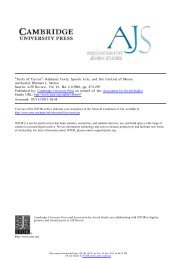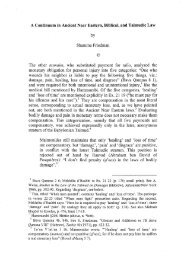Wimpfheimer_ Is it not so.pdf
Wimpfheimer_ Is it not so.pdf
Wimpfheimer_ Is it not so.pdf
Create successful ePaper yourself
Turn your PDF publications into a flip-book with our unique Google optimized e-Paper software.
64 ❙ Barry <strong>Wimpfheimer</strong><br />
reachÐwhile the renter is liable for ordinary loss or theft. The ®nal ®gure in the<br />
scale, one who watches an <strong>it</strong>em as a favor to <strong>it</strong>s owner (Free Watchman), is liable<br />
ne<strong>it</strong>her for force majeure nor for events of ordinary loss.⁵⁹ W<strong>it</strong>hin tanna<strong>it</strong>ic law there<br />
are two decisive factorsÐowner presence and negligenceÐeach w<strong>it</strong>h the power to<br />
undermine categorical liabil<strong>it</strong>y. On one extreme, owner presence exonerates those<br />
who are ordinarily liable. On the oppos<strong>it</strong>e extreme, negligence obligates those who<br />
are ordinarily <strong>not</strong> liable.⁶⁰<br />
In several cases elsewhere in the Talmud, Rava challenges the mishnaic sliding<br />
scale and requires a greater degree of fault than the one implic<strong>it</strong> in the Mishnah's<br />
model (see table 2). In one case, Rava exonerates a borrower if the animal dies (force<br />
majeure) in the course of ordinary work.⁶¹ In a<strong>not</strong>her instance, when called upon to<br />
adjudicate an unambiguous case involving the ordinary loss of a shepherdÐwho<br />
falls into the same category as the renterÐRava exonerates the shepherd against<br />
the objections of colleagues because the loss did <strong>not</strong> stem from any unwarranted<br />
activ<strong>it</strong>y.⁶² Even w<strong>it</strong>hin the exceptional case of a free watchman who is liable for<br />
negligence, Rava disagrees w<strong>it</strong>h his colleague Abayei and will <strong>not</strong> obligate if the<br />
negligence is <strong>not</strong> directly responsible for the animal's death.⁶³ Though the opening<br />
of the barn door that allows the animal to walk into dangerous terrain is a textbook<br />
example of negligence, Rava will <strong>not</strong> obligate the watchman if the animal dies of<br />
natural causes in the dangerous terrain. Since the act of negligence is <strong>not</strong> directly<br />
responsible for the loss, ne<strong>it</strong>her is the watchman.<br />
These cases combine to illustrate Rava's mindset when approaching the case in<br />
our narrative. Our case represents a con¯ict of decisive factorsÐthe exonerating<br />
owner presence and the obligating negligence. Because of Rava's focus on immediate<br />
causal<strong>it</strong>y as the only reliable <strong>so</strong>urce of liabil<strong>it</strong>y, he hears negligence and instantly<br />
obligates Bei ¼ozai. When the students point to Mar's presence as a factor, Rava is<br />
ashamed.<br />
But Rava's activism w<strong>it</strong>hin the liabil<strong>it</strong>y matrix has a supplemental explanation,<br />
one that deepens the shame portrayed in the narrative. In all three instances of<br />
maverick adjudication, Rava expresses lenience toward the one watching the other's<br />
goods. These lenient rulings form a pattern since the borrower or shepherd is<br />
generally the economically weaker party in this l<strong>it</strong>igation. Furthermore, in all three<br />
cases, the Talmud w<strong>it</strong>nesses the plea of this weaker party, <strong>so</strong>metimes in the

















